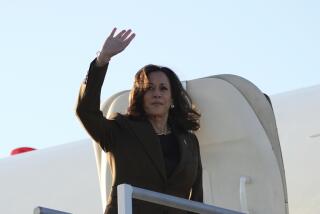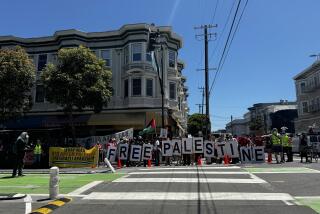Bradley Assails Gore on Campaign Trips
- Share via
MANCHESTER, N.H. — Bill Bradley, stepping up his criticism of Al Gore, rebuked the vice president Monday for not learning the lessons from the Democratic Party’s fund-raising scandals of 1996.
Speaking before about 200 students and faculty in the auditorium of New Hampshire College, the former senator from New Jersey reiterated his proposal to revamp the role of money in politics if he is elected president, while criticizing reports that Gore’s campaign is coordinating the vice president’s official appearances with his campaign strategy.
“In 1996, there were questions about where politics ended and government began in the Clinton-Gore fund-raising efforts,” said Bradley, his glasses perched on his nose as he read from a prepared speech.
Now, he added, “Cabinet officers are structuring their schedules and their announcements so that . . . Vice President Gore can finance his political campaign when his campaign funds run short. What’s happened here? What’s changed? Nothing has changed.”
In the 1996 campaign for the White House, Gore was criticized for attending a fund-raiser at a Buddhist temple in Hacienda Heights, Calif., and making campaign-related telephone calls from his government office. Both political parties were also criticized for improperly using unregulated voter outreach funds--or “soft money”--on campaign activities.
Bradley’s strong tone signals a markedly different tactic than the one he’s taken in the last few months, when he has avoided criticism of Gore or even a mention of his name. In recent weeks, however, Gore has attacked Bradley’s health care plan, prompting speculation about whether Bradley would respond aggressively.
In a town hall meeting Sunday night in Milford, the former basketball player repeated his promise “to run a different kind of campaign.” But he also added: “That doesn’t mean I’m going to stand like this forever and let someone slap my face.”
The Gore campaign issued a swift response Monday, accusing Bradley of distorting the vice president’s record.
“Al Gore has been a fighter for campaign finance reform since his earliest days in Congress,” Chris Lehane, Gore’s press secretary, said in a statement. “In 1979, Gore co-sponsored a bill for public financing of campaigns, he has been fighting for free air time and passage of the McCain-Feingold bill, and has called for a ban on soft money if the Republicans do the same.”
On Monday, Bradley spent most of his 40-minute speech detailing what he would do to ensure significant campaign finance reform, a proposal he first described last July in one of his initial policy speeches. He said he advocates banning all soft money from presidential campaigns, providing public financing in the general election for congressional and senatorial races and requiring television broadcasters to provide free air time to those candidates.
“Money in politics undermines the very idea of democracy: the idea that your voice is heard, the idea that government represents all people, not just the rich,” said Bradley. “If everyone outside of Washington wants this, from Wall Street to Main Street, why can’t politicians inside the Beltway respect this?”
Bradley also said he would encourage more participation in elections by advocating same-day registration and voting by mail. In past speeches, he has also declared his support for a voter leave law, which would grant employees two hours off work to cast their ballots.
Besides admonishing Gore’s actions, Bradley also reproached Congress for failing to pass campaign finance reform legislation during the last session. He accused elected officials of stalling on the issue because they reap the benefits of the system.
“Even after 1996, and the very public fund-raising problems of both parties, we still see no action,” he said. “Few people in Washington want the system to change. The reality is that, behind every public handshake, there has always been a secret handshake. That tacit, secret handshake signals an agreement among politicians not to upset a system they use to their advantage.”
More to Read
Get the L.A. Times Politics newsletter
Deeply reported insights into legislation, politics and policy from Sacramento, Washington and beyond. In your inbox twice per week.
You may occasionally receive promotional content from the Los Angeles Times.








